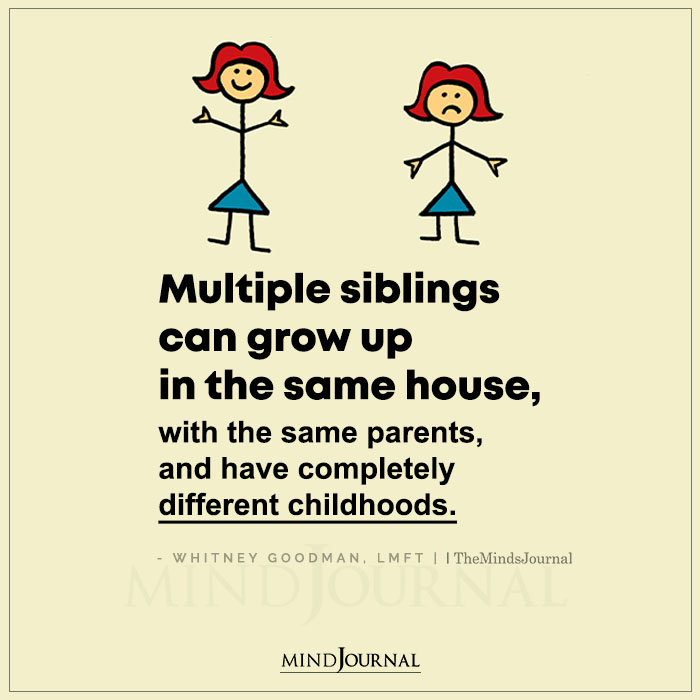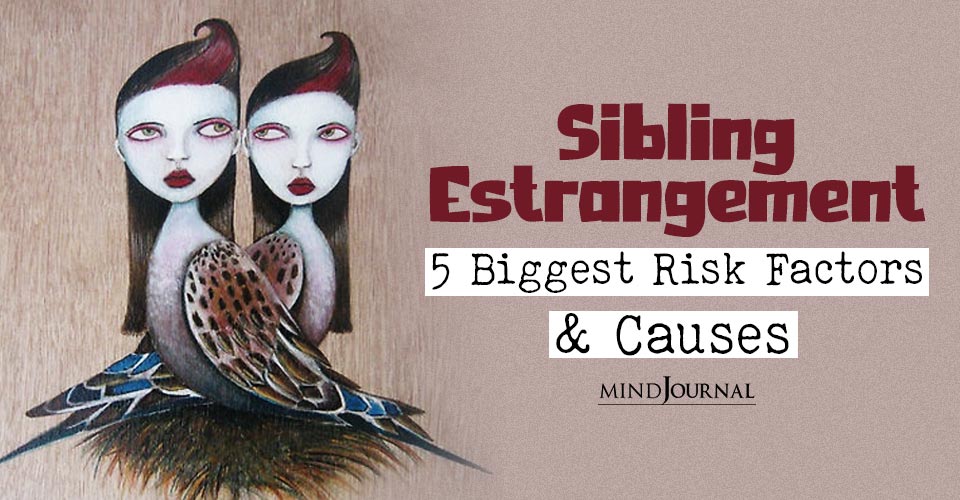International siblings day 2023 is knocking at the door. The Minds Journal Brings to you a special post on sibling estrangement.
Sibling estrangement, just like parental estrangement can be very painful to deal with. Even if you are not particularly close with each other, emotional distance from them is bound to hurt, because you will always have that sibling connection. Let’s find out what causes sibling estrangement, and the main reasons for sibling estrangement.
Key Points:
- Estrangement often occurs when a sibling’s life changes and he or she must redefine his or her role in the family.
- To steer clear of a sibling cutoff, being mindful of the risk factors for estrangement can help.
- Siblings renegotiate their relationship over time.
Certain moments are especially vulnerable for the sibling relationship, as brothers and sisters must renegotiate how they interact with one another over the course of a lifetime.
In fact, estrangement often occurs when a sibling’s life circumstances change and he or she must redefine his or her role in the family.
Here are some of the perilous turning points in sibling relationships.
5 Moments When You Are Most at Risk of Sibling Estrangement
1. Adolescence.
A teenage sibling, individuating and creating his or her own identity, leaves home for college or a job. He or she may challenge parental authority, changing the established sibling relationships and dynamics in the family.
When my older brother left for college, he wanted to leave behind the dysfunction and difficult relationships in our family. While he and I were never particularly close, we did have a sibling connection.
However, at this moment, he chose to leave the past behind him, and our relationship becomes a casualty of his desire to abandon the problems of the family.

Related: 30+ Hilarious Siblings Day Memes To Celebrate An Unbreakable Bond
2. Marriage.
A new in‐law joins the family and may want to control how much time the couple will spend with parents and siblings. The new in‐law may have values and beliefs that differ from those of the original family, although such issues aren’t essential to cause strife.
At one possible extreme, a sibling or child marries someone who turns out to be a narcissist. One reader wrote to me about how her new daughter-in-law removed her son from the family:
“It started slowly and in time the spouse has increased with more and more control, brainwashing, and gaslighting on our son. Our narcissistic daughter-in-law seems to have a calculated plan. She has completely changed our son and cut him off from the family. Nothing we do in his and my granddaughters’ lives seems to change this.”
Related: 7 Warning Signs You Have A Toxic Sibling
3. Birth of a baby.
As a sibling focuses on his or her new family, some family members may feel abandoned or betrayed. Often, sibling rivalry continues into adulthood; siblings may even compete with each other through their children.
At its worst, an estrangement occurs, and aunts and uncles may be heartbroken if they don’t have the opportunity to develop a relationship with their nieces and nephews.
Estranged siblings, when denied the role of aunt or uncle, also may find that their children suffer from not having the opportunity to know their cousins.
Indeed, children often are caught in the crossfire of sibling estrangement, with damage extending through generations. When her nieces were young, one woman said, she enjoyed a close relationship with them.
But when her sister cut her off, she lost relations with the entire family. Being deprived of the relationship with her nieces, she said, has been more devastating than the estrangement from her sister.
4. Divorce and marital problems.
The emotional and possible financial responsibilities of helping a divorcing family member—or one whose marriage is in trouble—may overwhelm one sibling, creating disagreements over how to handle the situation or resentment at an unevenly shared burden.
In an especially painful twist, one woman revealed the truth when she learned that her brother-in-law was cheating on her sister.
But the sister, far from confronting her husband, essentially “killed the messenger” by instead terminating her relationship with the sister who had shared the disturbing news.
Related: What Sibling Abuse And Bullying Looks Like
5. Parental illness, death, or inheritance.
Siblings may stage a last-ditch competition for power, love, and family loyalty. Difficult conflicts arise over who will make health care arrangements and payments for an elderly parent; who will pay for long‐term care, and who will inherit treasured family possessions.
Fights over money may become especially vicious as a parent approaches the last stage of life. Divisive topics, such as healthcare decisions and caregiving needs, may reignite old conflicts.
Often, caregiving falls disproportionately on one sibling. Caring for parents as they decline is a relentless, painful vigil that may cause unprecedented strain and stress.
A parent’s death may add to the pressure, rather than relieve it. Unresolved estate issues can entangle estranged siblings, and, in some cases, siblings who have had years of separation suddenly must interact again.
Previously, I identified risk factors for sibling relationships. These include:
- Family trauma
- Parental Favoritism
- Sibling Jealousy
- Poor Communication Skills
- Family Values, Judgments, and Choices
- Political differences
- Alcoholism addiction and other mental health issues
- Money
- Narcissistic families and siblings
Those who hope to steer clear of a sibling cutoff should be mindful of the risk factors for a cutoff, as well as the perilous moments when a sibling relationship is most vulnerable.
Want to know more about being estranged from siblings? Check this video out below!
To learn more, buy The Sibling Estrangement Journal! https://www.amazon.com/dp/B0BLLTT6SJ#SalesRank
Written By Fern Schumer Chapman Originally Appeared On Psychology Today










Leave a Reply